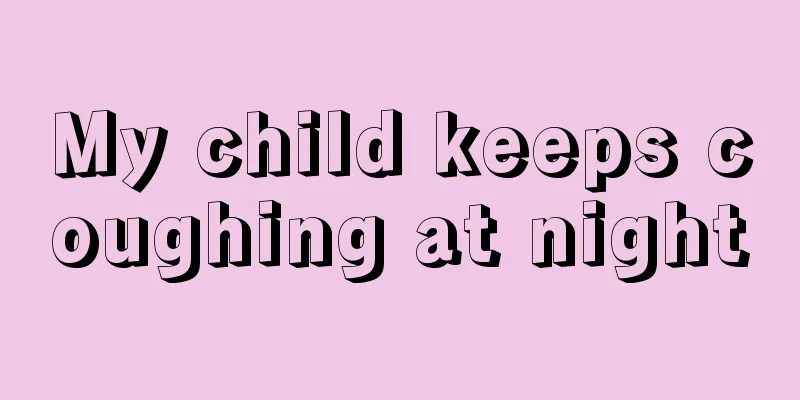Why do children have trouble sleeping?

|
Poor sleep at night refers to the inability to fall asleep, shallow sleep, frequent dreams and easy awakening, etc. This situation is very common. Most of the time, it is caused by too much mental stress, complex environmental factors, or it may be caused by one's own illness. However, children may also have trouble sleeping. And the child will cry all night long. So how should we treat babies who have trouble sleeping at night? Understand your baby's sleep time. A newborn baby one month old needs to sleep 16 to 18 hours a day; babies from one month to six months old need to sleep 14 to 16 hours a day; children from six months to one year old need to sleep 13 to 15 hours a day. Understanding Infant and Toddler Sleep Hours Infants and young children's sleep time needs to be divided into several segments a day. Children under two years old should have at least two naps a day, and children two years old and older should have at least one nap a day. Whether your baby gets enough sleep can be judged by the baby's activity level and growth and development. Babies can be trained to develop good sleeping habits from birth. Regular sleep patterns can reduce the mother's burden and increase milk secretion. The importance of adequate sleep for babies Night sleep of babies will affect their growth and development: 10 p.m. to 1 a.m. is the critical period for the secretion of growth hormone in babies; the process of energy storage when babies sleep: good sleep can make babies full of energy; baby sleep will affect intelligence: good sleep can improve baby's intelligence and promote the development of baby's thinking ability. Appropriate nutritional supplements are also important for your baby's good sleep quality. When purchasing milk powder, you can choose milk powder with whey protein, which contains tryptophan, which can promote the development of the nervous system; you can choose milk powder with structured fat OPO, which can promote the baby's absorption of calcium; at the same time, pay attention to supplementing cod liver oil, take your children outdoors, and let the baby synthesize vitamin D by himself. The article introduces some methods to deal with babies who have trouble sleeping at night. Babies who have trouble sleeping at night are mainly frightened or affected by environmental factors, such as poor air circulation, too bright or too dark lights, too high indoor temperature, hunger or urination, etc. Therefore, when a child cries and can't sleep, you need to find the cause as soon as possible. |
<<: What should I do if my baby has a bacterial cold and cough?
>>: What should I do if my child’s memory declines?
Recommend
What should I do if my baby makes phlegm sounds when breathing while sleeping?
Under normal circumstances, the baby's breath...
What causes convulsions due to fever in children
Parents are more concerned about their children&#...
How to treat amblyopia in children and what should we pay attention to?
Nowadays, many children suffer from eye diseases,...
What is the treatment for absence epilepsy in children?
If a person falls to the ground with convulsions ...
How to relieve children’s poor appetite?
If a child has a poor appetite, he will eat less,...
Can children use nano steaming?
In big cities, you can often see some steaming pa...
How old is the baby when he doesn't want to eat at night?
Mothers often cry when their babies are feeding a...
What should I do if my child keeps coughing after having a fever?
What’s going on with my one and a half year old b...
What to do if your five-month-old baby doesn't poop
When babies are five months old, they are very cu...
What's the matter with the blue vein in the middle of the baby's nose?
The baby is the treasure of the family and is alw...
What are the symptoms of lysine deficiency in children?
Our bodies need lysine for normal development, an...
What should I do if my baby has a short tongue?
When parents observe their children and find that...
What are the first aid measures for children drowning in swimming?
Every summer vacation, we hear news of many child...
What to do if your child has depression tendencies
We all know that in the process of children's...
What to do if your 40-day-old baby has eczema
Babies who are over 40 days old are just one mont...









